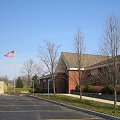- By Dan Veaner
- News
 Print
Print  After two or three months of discussion on raising water rates a total of about 17% the Bolton Point Water Commission voted to approve the rate hike. All five municipalities that partner in Bolton Point would have to approve it including the Towns of Lansing, Ithaca and Dryden and the Villages of Lansing and Cayuga Heights had gone along. Last month the Town of Lansing voted no, which sent it back to the drawing board. But rather than change the rate commission members pressured Town representatives to change their minds. At Wednesday's Town Board meeting they did just that.
After two or three months of discussion on raising water rates a total of about 17% the Bolton Point Water Commission voted to approve the rate hike. All five municipalities that partner in Bolton Point would have to approve it including the Towns of Lansing, Ithaca and Dryden and the Villages of Lansing and Cayuga Heights had gone along. Last month the Town of Lansing voted no, which sent it back to the drawing board. But rather than change the rate commission members pressured Town representatives to change their minds. At Wednesday's Town Board meeting they did just that."Last month we actually voted that down," said Lansing Town Supervisor Scott Pinney. "One of my concerns is that the rate is raised a little over 17%. The commission voted to do that even though the two commissioners from Lansing, Connie and myself were very strongly against that. They moved forward on it anyway. Some of the municipalities have voted for it already and are ready to move forward with it. After meeting with them last month there was a lot of pressure to move forward with this because it's so late in the year."
Pinney explains that because many of the municipalities are on a January 1st to December 31st fiscal year, they would lose income from whatever rate rise could be passed because they would not be able to start charging the higher rate until the second quarter, assuming a rate could be agreed upon by then. Town and village water rates are set in addition to the Bolton Point rate, so couldn't be set until the water commission rate is. Pinney says that because the municipalities have already passed budgets based on anticipated water rate income (and sewer rates, which are calculated based on water rates), that not passing the rise now could cause fiscal problems for the municipalities.
"I guess at this point, even though I am against what has happened, I think that it's in the best interest of everybody to move forward with it," he said. "I think it would cost more money in the end if we didn't. I think the commission really got the message that next year, certainly if two people from one municipality don't agree with a rate change they won't move forward with it at that time."
Deputy Supervisor Wilcox said that the Town of Lansing was the only municipality whose two representatives both voted no, but other commission members were also opposed to the rate hike. And the Lansing Town Board was the only one that voted against the rate hike. Pinney said he thinks it is the first time in the commission's history that something like this has happened, and that he hopes everybody will be in agreement before the commission tries to move forward.
"They need to have a 20 year plan in place," Wilcox said. "I think they got the message loud and clear."
Councilwoman Kathy Miller noted that Lansing residents have complained in past meetings about the minimum water rate, saying they typically don't use the amount of water they are being charged for. She asked whether the rate hike changes the minimum water rate. The answer is yes. The minimum number of gallons doesn't change, but the cost for it does.
Andy Sciarabba also complained that the commission charges business for an annual back flow preventer inspection, which he said is unnecessary. He said that an inspection every two or three years might be fair, but a yearly inspection.
"It's getting outrageous," he said. "I've had properties for over 25 years and back flow preventers have never failed. Like anything else, it's government more and more saying 'pay us fees, pay us fees, pay us fees'."
"We'll take a hard look at that next year," Pinney said. "My opinion is that when you're talking about a 17% increase you should really be talking about cutting certain things in the budget. It was sold as 10% of this being for capital projects, but it wasn't a capital project fund. The increase goes to the main fund."
The board voted to approve the rate hike 4 to 1 with Robert Cree dissenting.
----
v6i48



